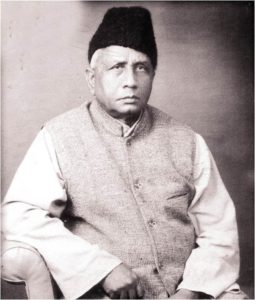 Ahsan Danish
Ahsan Danish
(Iḥsān Dānish)
(1914-82)
 Ahsan Danish
Ahsan DanishAhsan Danish Iḥsān Dānish; 1914-82; also Ehsan Danish, Ihsan Danish) was born Ahsanul Haq (اIḥsānul Ḥaq) in Maulanan Kandhla, Shamli District, in what is today Uttar Pradesh. Despite his family’s poverty, he managed to learn Arabic and Persian on his own and struggled to make a living as an ordinary laborer. Moving from his village to Lahore as a teenager, he worked as construction worker, gardener, cook, painter, watchman, bookshop clerk, whatever odd job that would come his way, eventually becoming one of Pakistan’s foremost poets. But despite working long hours during the day, he spent his evenings, as he reports in his autobiography, Jahan-i dānish (Danish’s World; 1973), reading voraciously, writing poetry, and attending and eventually participating in mushā’irahs.
His earliest poetry was marked by the romantic preoccupations of the ghazal tradition. However, due in good part to his struggle to make a living and the influences of the independence movement and Progressive trend in Urdu poetry, he shifted to issues of the freedom movement, social justice, and especially the dignity and worth of the proletarian class, such that he was dubbed “shā’ir-i mazdūr” (the working-man’s poet), a complement to Josh Malihabadi as the “shā’ir-i inqilab” (poet of revolution), to whom he is often compared.
During World War II he wrote one of his many poems in support of Indian independence, “Tarānah-yi jihad” (Anthem of Holy War)* from Ātish-i k̲h̲āmosh (Fire of the Silent; 1943). Among his eighty books are Nafir-i fit̤rat (Clarion of Creation; 1940), a collection of essays and poems; volumes of poetry: Maqāmāt (Places; 1942?), Navā-i kārgar (Voice of the Working Man; 1944), Goristān (Cemetary; 195?), and Shamshīr o sinān: avval (Sword and Spear: Part 1; 1968) , two highly praised critical literary studies: of Ghalib, Tashrīḥ-yi ghālib (Explaining Ghalib) and of Momin (Mūmin: ḥayāt o shā‘irī; Momin: Life and Poetry; 1958), along with numerous essays on a wide variety of topics, including the Urdu language, linguistics, religion, and the economy.
See Rauf Parekh, “Ehsan Danish: a labourer, poet, lexicographer,” Dawn, 14 March 2016.
Ātish-i k̲h̲āmosh (Fire of the Silent). Lāhaur: Maktabah-yi Dānish. 1943.

